Papa Vinyard here, now here's a little somethin' for ya...
This column will tackle an Oscar winner from each year starting with the inception of the Academy Awards in 1929. My goal is to highlight lesser-known films from throughout cinema history that were able pull down one (or more) of the Golden Statuettes that remain such an integral part of Hollywood lore. I will also take a close look at the actual element(s) that the film was given awards for, with my analysis on how they hold up with years (or decades) of cinematic history in the rearview since. Today our subject, the 2011 Margaret Thatcher biopic THE IRON LADY, won two Oscars back in '12, one for Best Actress and another for Best Achievement in Makeup. Next time we meet, I'll be tackling THE BIG HOUSE (1930), which won Best Writing and Best Sound Recording back in 1930.
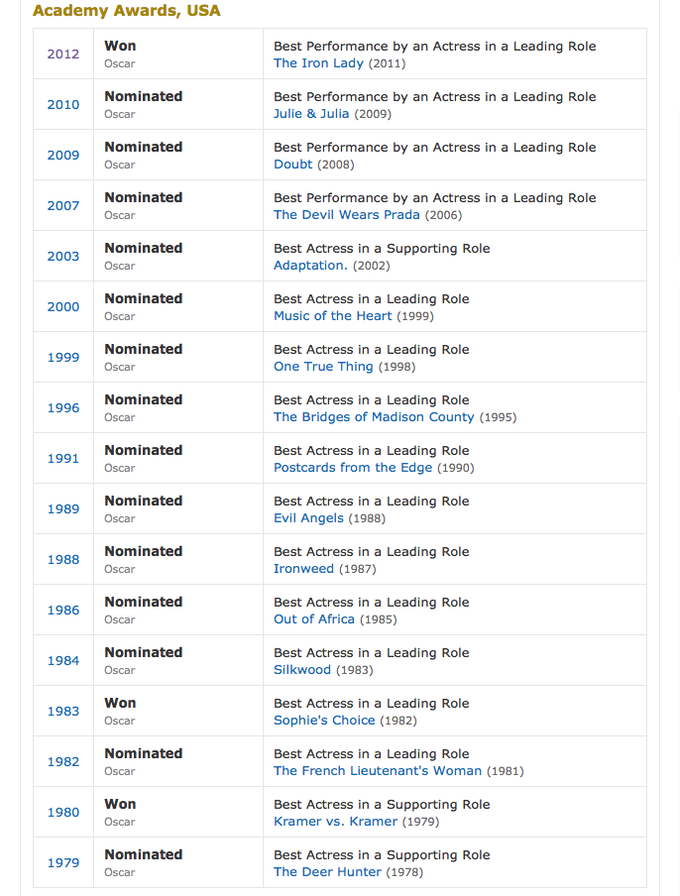
You see that list? That's the list of every Academy Award Meryl Streep has been up for (or won) since her first nomination for THE DEER HUNTER back in '79. That's 17 Oscar nominations people, more than any actor in the history of cinema (although the record for actual wins goes to Katherine Hepburn, who trumps her three with four), the last one landing her her third statue for her portrayal of former Prime Minister Margaret Thatcher in 2011's THE IRON LADY.
Her acceptance speech seemed to say it all. "When I heard them call my name, I had this feeling I could hear half of America going, 'Oh, no. Oh, come on, why? Her. Again," which she quickly (and awesomely) followed up with "Oh, whatever." Even Meryl herself was aware of how throwing accolades her way had almost become a cliche of the zeitgeist, and the Academy in particular. But there it was, her third Oscar, her first in almost 30 years, winning one of the two awards the film nabbed that night, the other for the exceptional makeup work.
However, these were the only two awards the film was up for, and I'd heard that the film was only notable for Streep's performance, and little else. Friends had slept through it, and critics refrained from singing its praises (it stands at 51% on Rotten Tomatoes and 54% on Metacritic). Therefore, despite my limited knowledge of her time in office, I had little interest in checking the film out until I decided to analyze it for this column.
I gotta say, I was fairly surprised with the results.
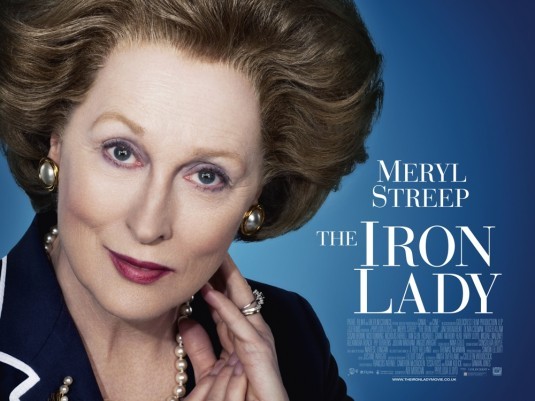
We open on an old British lady buying a pint of milk from a grocery. The woman, clearly a frail octogenarian, shuffles through the small shop towards the counter, and is mostly ignored while she balks at the 49 pence pricing of the milk. She walks her elderly frame down the London street back to her home and enjoys a breakfast with her husband ("Milk's gone up!" she moans. Her husband replies, "We could always sell the car.").
Then one of the old lady's aides walk in, and reveals that she has been sitting alone, talking to herself. An onscreen title reveals who the mentally-failing, easily ignored woman is: THE IRON LADY, a.k.a. Margaret Thatcher, Prime Minister of the U.K. from 1979-1990, the longest serving British Prime Minister of the 20th century and, of course, the first (and last) woman to date to hold the highest position of the English Parliament.
Thus begins Phyllida Lloyd's film about Ms. Thatcher, which depicts the former politician as an elderly lady suffering from the onset of Alzheimer's about five years before her death in 2013 (a newspaper dates the film as taking place in 2008). By the opening title, we have already surmised several things. One, that Ms. Thatcher is so old and forgotten that she can calmly walk to the local store without fear of being hassled. Two, she hallucinates the presence of her husband as a subconscious form of day-to-day comfort. And three, that Meryl Streep and some magnificent makeup work are thoroughly up to the task of depicting this real-life figure without a hint of artifice or self-aware theatricality. And we're only 3 and a half minutes in!
The film primarily shows Ms. Thatcher dwelling the Belgravia, London residence where she spent her time before the difficulty of its stairs forced her to relocate to a hotel for the remainder of her life. As she interacts with her daughter Carol, her nurse June, and the visions of her late husband (Denis, who passed away in 2003), she recollects major moments of her political (and personal) life, starting from when her father, who served as the Mayor of Grantham when he wasn't working as a grocer, inspired her to enter politics.
Obviously, her rise to power in the '60s and '70s was a difficult one, considering her gender. To compete with her conservative competitors, she had to push her politics farther to the right than any of them, and listened to her advisors when they told her to alter her voice and hairstyle to boost her image. Getting elected as P.M. does nothing to alleviate her stresses; as anyone familiar with modern world history can surmise, Thatcher's reign was a difficult, trying one, even without the burden of being the first woman in the position. She contends with the war in the Falkland Islands, labor strikes, betrayal from within her own cabinet, and even a 1984 bombing attempt on her life.
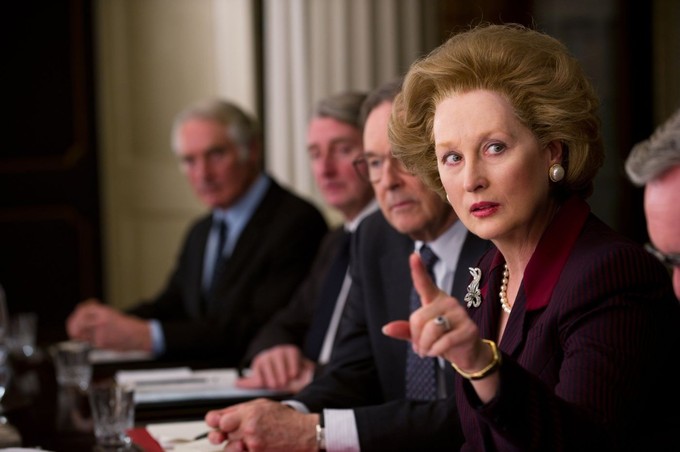
We see all this and yet, I do not consider THE IRON LADY to be a political film. No, I think the film is more defined by what would traditionally be referred to as the "bookends", the scenes with Thatcher old, mentally fragile, and widowed, powerless to change what her role will be in history, and losing her firm stance that her priorities were always in line. She misses being in power, as a scene of her speechifying at a dinner party makes evident, she misses her son, who has relocated to South Africa, but above all, she misses her darling Denis, whom the real Thatcher eulogized with these words: "What a man. What a husband. What a friend."
Yes, to what many may consider its detriment, but I feel is its most winning attribute (as a story, at least), the film is something of a love story. Even though Denis had little involvement in Margaret's political career, he is the second-most central figure in this narrative and is the window we get into what Margaret was like not as a politician, but as an ambitious, confrontational British woman who had nothing but scorn for the idea at being simply "one of those women, who stands slightly and pretty by the arm of her husband, or remote and alone in the kitchen doing the washing up, for that matter." Every time the elderly Thatcher realizes that she has been talking to herself and that her husband is long gone, we feel the pain of a leader who was more concerned with her own achievements than with spending time with her family and now, in her twilight years, has no choice but to be defined primarily by her controversial, oft-tumultuous reign.
Perhaps the decision by Phyllida Lloyd and screenwriter Abi Morgan to make the film more about Thatcher settling into old age and less about her earning her titular nickname helped the film, but it certainly didn't help its reception. Roger Ebert, in his two-star review, asks, "Was she a monster? A heroine? The movie has no opinion. She was a fact. You leave the movie having witnessed it." The decision by the Academy to only grant nominations for Streep's performance and the makeup work seemingly confirms the narrative's "thin" framework, which downplays the serious international ripples of Thatcher's actions as P.M. in exchange for a romanticized look at the retired despot yearning for the companionship of her deceased husband.
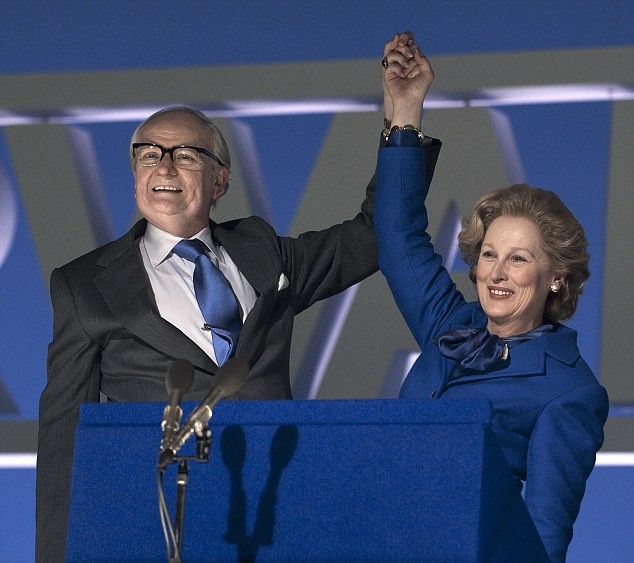
However, I must admit, I was choked up for much of the "softer" content of the film. Sure, a BBC miniseries would probably spend more time discussing the motivation behind the 1984 hotel bombing, the decision by former advisor Michael Heseltine to run against her in 1990, or her relationship with then-President Ronald Reagan but I doubt it would've found time for little moments like Thatcher recalling her husband's hand over hers at an early production of THE KING & I, or her packing all of his things in a fevered rage to exorcise his constant presence from her psyche. THE IRON LADY is, to me, more than anything else, a sad story about an old woman coming to grips with how much she loved her husband, and how much his loss deeply affected her. What distracted her from him while he was alive is all fine print.
Even with the more lovey-dovey stuff, there's still Meryl, charging through Parliament with her pearls, her smart, shoulder-padded getup, and her impeccable hair, demanding action and chastising weakness like everyone remembers old "Maggie" doing and even if the "political stuff" is not the central thrust of the narrative, it still had to be convincing and even engaging. Needless to say, Streep pulled it off. Beyond the physical transformation, which would be the highlight of many other actresses' portrayal of this figure, she inhabits Thatcher entirely, from her shrill, in-check voice, her frozen-stiff physicality, and her innate ability to control a room with a couple of well-versed platitudes.
If the film landed soft on critics, Streep's performance certainly did not. A quick look at Rotten Tomatoes gives you snippets like this: "Streep's performance is so true and so uncannily accurate, so full and so complete in its understanding, that she is fascinating every second she is onscreen," (Mick LaSalle). "Is there anything that Meryl Streep can't do as an actress? One can only marvel at her virtuoso performance as Britain's Margaret Thatcher in THE IRON LADY," (Peter Travers). "Streep is her own irresistible show as she assumes, with the precision that is her trademark, the character of the U.K.'s staunchly conservative prime minister in the 1980s," (Lisa Schwarzbaum). Shoot over to IMDB, and you'll see that Streep, aside from her accolades and her Oscar, also netted down a Golden Globe, a BAFTA award, London and New York Critics Circle awards, and a host of other nominations.
Even so, until the moment where she sighed and moaned her way onstage back in 2012, no one was all that sure she was going to lock down the coveted golden statue. It's easy to forget that, at this time two years ago, THE IRON LADY had yet to really be seen (it wouldn't be released until the last possible Oscar-qualifying second, on December 30th), and the frontrunner for Best Actress was actually Viola Davis for THE HELP. Even weeks before the ceremony, the L.A. Times, the New York Times, Entertainment Weekly, Hollywood Reporter,Indiewire, and many more all had Davis as a lock for the award. So what was it that in the end, clinched the already-legendary, two-time winner for the award?
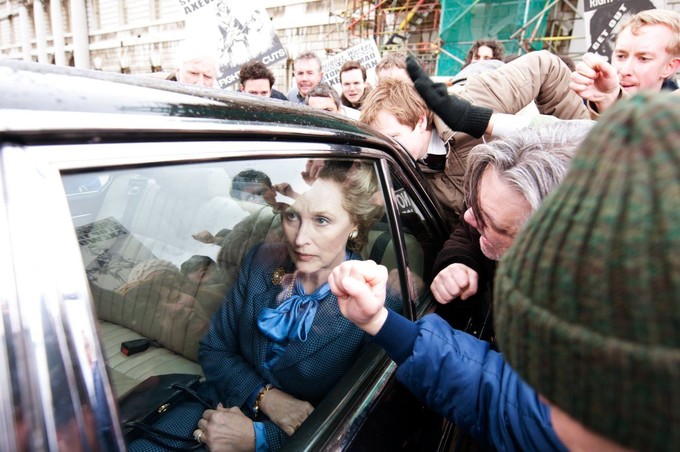
Seven of Streep's prior 16 Oscar noms were for playing real-life figures (or vaguely fictionalized ones), and none of them had actually pulled though and won, so it's not simply the "biopic factor". She'd played the "ailing older lady" (ONE TRUE THING), the "stern, cold schoolmarm", (DOUBT), and even the mannered '70s/'80s public figure (JULIE & JULIA). So what was it about her Thatcher that earned her the Academy Award that night?
One might argue that it was the level of Thatcher's fame that connected her performance to the countless Academy members who remembered her term as P.M., but I think it was just as much for rendering the controversial figure as a human being as it was for looking, sounding, and acting like her. It would be one thing to simply throw on the pearls and funky teeth, bossing around actors like Richard E. Grant and Anthony Head with her flawless, high-pitched accent, but it's another thing entirely to invisibly humanize this politician to the point that we forget about her pragmatic, oftentimes cold and brutal career and simply accept her as a human being, warts and all. When we see how much it wounds her to be looked at as a well-dressed poser amongst the ranks of Parliament, we understand when her policies sound less like attempts at compromise and synergy than stabs at permanent, rippling impact. She was the first female Prime Minister, and her legacy was just as important to her as the job at hand. Unfortunately, there hasn't been another female P.M. to date; the jury's out on whether Thatcher's overly-aggressive tendencies have played a part in keeping them out of contention.
And if it was Thatcher the P.M. that convinced the voters' minds, it's the relationship with Denis that sealed the deal by winning over their hearts. It's a love story told not in broad strokes, but in little moments. The couple dancing on the eve of their engagement and then half a century later in Margaret's fantasies. Her hallucinating Denis doing a little dance for her before he trots off to work. Hiding her private conversations with her unseen husband like a child pretending not to be on the phone with a crush. As someone who was two years old when Thatcher left office, this stuff made just as much (if not more) of an impression on me than the details of her political career, and it is Streep's natural performance as the frightened, increasingly-forgotten Thatcher that makes her romance with Denis feel like something profound and affecting. I don't know about real life, but I have no doubt that the Margaret Thatcher of THE IRON LADY owes a huge debt to Denis' constant love, compassion, and unflinching support, and that's largely due to Streep's magnificent, knowing performance (as well as Jim Broadbent's as the jovial, unfettered husband).
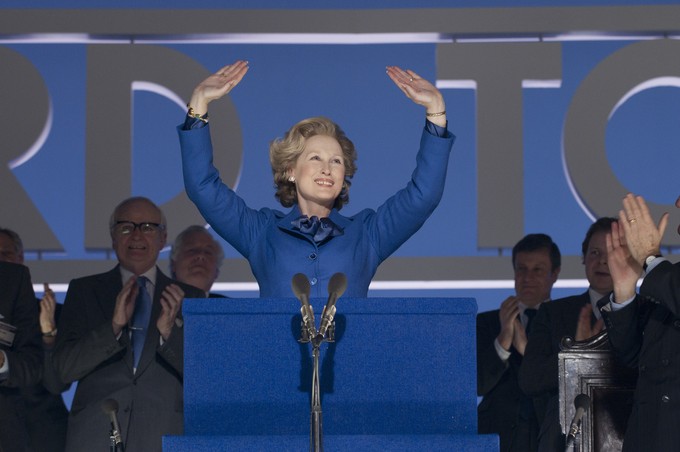
While the structure of the film may have necessitated shifting around events chronologically, the makeup work by Mark Coulier (unrelated to Uncle Joey) and J. Roy Helland earned the film's second Oscar by sticking frightfully close to reality. Obviously, this isn't a FROM DUSK TILL DAWN or FROM BEYOND-style latex-fest or anything like that and while the touch-ups on the various members of Thatcher's cabinet are impressively subtle, the bulk of the makeup department's efforts was obviously directed towards depicting the title character.
The prosthetics for the elder Thatcher are invisible and, if not 100% successful at replicating the puffiness that the former P.M. had in her old age, perfectly complementary to Streep's weathered, lived-in performance. But in depicting Thatcher in her prime, Coulier and Helland's work is borderline-unreal. With the hair, strong jaw, and crooked teeth firmly in place, it is remarkable how well Coulier and Helland were able to replicate the image of one of the more recognizable western political figures of the latter half of the 20th century. If they didn't do their jobs well and Meryl didn't look, from stem to stern, like Thatcher, the movie would utterly fail; as is, the movie will be known, in years to come, as "The Margaret Thatcher movie", and that is in no small part due to the efforts of the incredible makeup duo (including Helland, who's been Streep's exclusive hair and make-up guy since SOPHIE'S CHOICE) that totally earned their first Academy Awards.
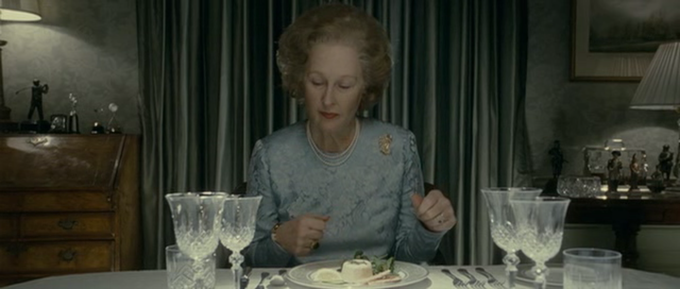
So Streep, Coulier, and Helland have their Oscars for their efforts, but the rest of the film is already mostly-forgotten and dismissed as a run-of-the-mill biopic that, like Oliver Stone's W. before it, failed to live by the convictions of its political stance, and was content to simply replicate known events in modern world history without any sort of subtextual commentary. This woman was one of the most controversial politicos of her time, and she had only left office about 20 years prior to the film's production; surely Phyllida Lloyd and Abi Morgan could muster up some of their own feelings towards the "Iron Queen" to inject into their biopic and really make it connect with the subjects (and observers) she slighted over the years! Even Streep's win, her third after an unmatched roster of nominations, was an upset, and the award was expected to go to her DOUBT co-nominee, Viola Davis. Its Rotten Tomatoes score is the lowest amongst all the other winners that year, including RANGO, THE MUPPETS, and THE GIRL WITH THE DRAGON TATTOO, by over 30 points.
But when I think of the film in years to come, I will remember almost crying at the thought of Ms. Thatcher mentally flailing in an effort to keep the memory of her husband alive and well. I'll remember that, instead of mining every headline in the newspaper in search of material for her dinner speeches, she would instead linger on the minute remnants of her gone, but not forgotten husband. That her family was "appalled" by this portrayal, or that certain events (like the massively coincidental IRA bombing of MP Airey Neave right in front of her eyes) were fabricated or exaggerated for the sake of the narrative, are of little concern to me. To paraphrase THE MAN WHO SHOT LIBERTY VALANCE (and to reiterate a point I made in my SEARCHING FOR SUGAR MAN write-up), "If you have to choose between fact or legend, print the legend." It just so happens that, in this case, the "legend" of Margaret Thatcher is not about her arch-conservative, militaristic stance towards global politics or her hardline policies towards British labor unions, but rather that of a middle-class woman who took no shit from the men in charge, and fought her way into the highest elected position in British politics, with the cost of the loss of time spent with her family only hitting her when her office is closed down, her party has moved on, and her loved ones are either dead, moved away, or dismissive of her emotions.
It's a good story with deeply human elements, marvelously portrayed by one of the finest screen actresses of her generation (and maybe, to date) with the help of rightfully-recognized make-up work. I don't think those two Oscars went home in the wrong hands that night two Februaries ago. Not by a damn sight.
-Vincent Zahedi
”Papa Vinyard”
vincentzahedi@gmail.com
Follow Me On Twitter
